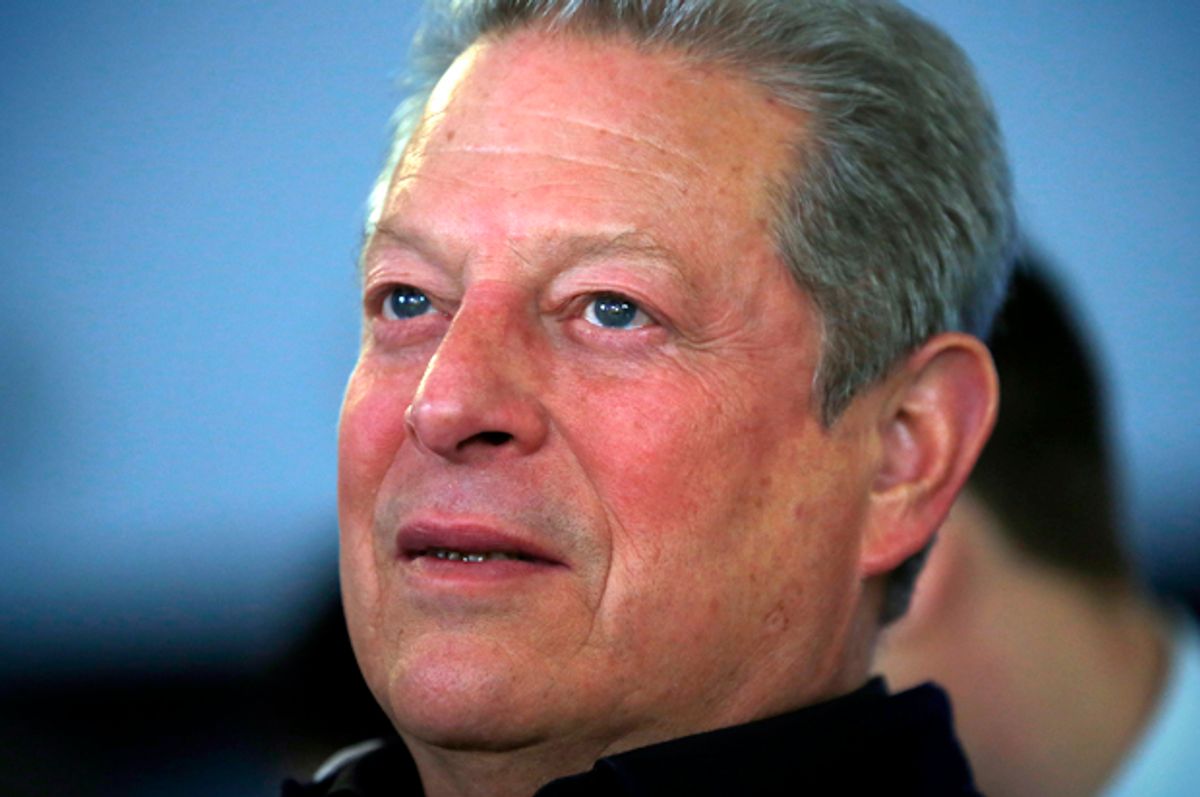It probably won't happen but, frankly, it really, really needs to happen. This week, Buzzfeed reported that advisers close to former Vice President Al Gore are "figuring out a path" for him to enter the race for the Democratic nomination.
A "senior Democrat" revealed that the Gore camp is "getting the old gang together" and that "they’re figuring out if there’s a path financially and politically. It feels more real than it has in the past months." A second source said, "This is people talking to people, some of whom may or may not have talked to him."
On Friday, however, Gore adviser Betsy McManus dispelled the rumors, telling Politico, "There’s no truth to it. He's laser-focused on solving the climate crisis."
Sure, but what better way to help solve the climate crisis than by ascending to the presidency next year. We'll circle back to this point.
It goes without saying a Gore candidacy would absolutely upend the nature of the Democratic race, and it's difficult to see Gore failing to present a serious challenge to the Clinton campaign, especially given what occurred 15 years ago and the subsequent feelings of lingering rage and injustice that went along with the recount and, ultimately, the Bush v Gore decision. Five hundred votes changed history, and it's heartbreaking to imagine how the 2000s would've played out had the recount continued, culminating in an inevitable Gore victory.
If Gore had been the president we desperately needed during that decade, it likely would have meant prioritizing the climate crisis in a way that no other American political leader ever has -- even Obama, whose record on this issue has been solid, but not solid enough. That's not to say a future President Gore would necessarily have the political strength to win over skeptics and deniers enough to support serious legislative remedies in the Republican-controlled Congress. That'll never happen. Not even when rising sea levels overtake Washington and West Virginia properties enjoy an ocean view.
But what Gore will surely accomplish is to put the issue front and center where it needs to be. The problems we face are legion, but it's difficult to conjure an issue that's more consequential than, you know, the survival of humanity in the face of an increasingly toxic climate.
This isn't to say that the other candidates don't bring with them important priorities. Voting rights are crucial. Strengthening the middle class is a top shelf issue, too. So is education, health care, civil liberties, reproductive rights and overturning Citizens United. But we won't be able to do any of those things if we're fighting wars over shrinking water supplies or spending billions to hold back rising tides and mitigating damage from droughts and worsening hurricanes. We're on a path to inevitable and stupendous obliteration and it's already happening. Yet our very serious political leaders are debating fraudulent sting videos about Planned Parenthood; we're screeching about whether Mexicans are rapists; and our news media won't cover the climate crisis because it's not sexy enough.
Something is horribly, horribly wrong, and we need real leadership in order to re-prioritize.
Along those lines, it's highly unlikely that Gore would abandon his passion for this issue upon entering the race, nor would he pivot entirely to another list of priorities after he's inaugurated. Odds are, as president, he'd use the bully pulpit to become not only a national leader on the issue, but a lion on the world's stage. Again, this certainly won't endear him to the congressional Republicans, but screw them. History will judge the deniers accordingly. (By the way, history will also judge anyone of any party who delayed when action could've been taken.) But given the accomplishments of the Obama administration via legislation and executive orders, Gore would easily build upon previous moves while publicly emphasizing the scale of the crisis.
That last point is critical. Until Obama, no president has ever mentioned the climate crisis in either an inaugural address or a state of the union. Not one. Not even Clinton. But even Obama has been sidetracked by other issues -- again, important ones, but at the expense of the most important one. It's easy to predict that Gore would push the urgency of crisis in a way that'd be not only persuasive to voters on the fence about it, but also in a way that embeds the appropriate degree of urgency in the minds of Americans bothering to pay attention.
Realistically, this election might be the last opportunity to elect a climate president — a true leader on this issue, a leader with heft. Eight or twelve years from now might be too late. Indeed, 2016 might be too late. We need President Gore, and it's almost mandatory. History and our future as a species could depend upon it. And while it's true that his work as a private citizen has been invaluable, and will continue to be, it also desperately needs to be refueled and reignited, and the presidency can do that.

Shares